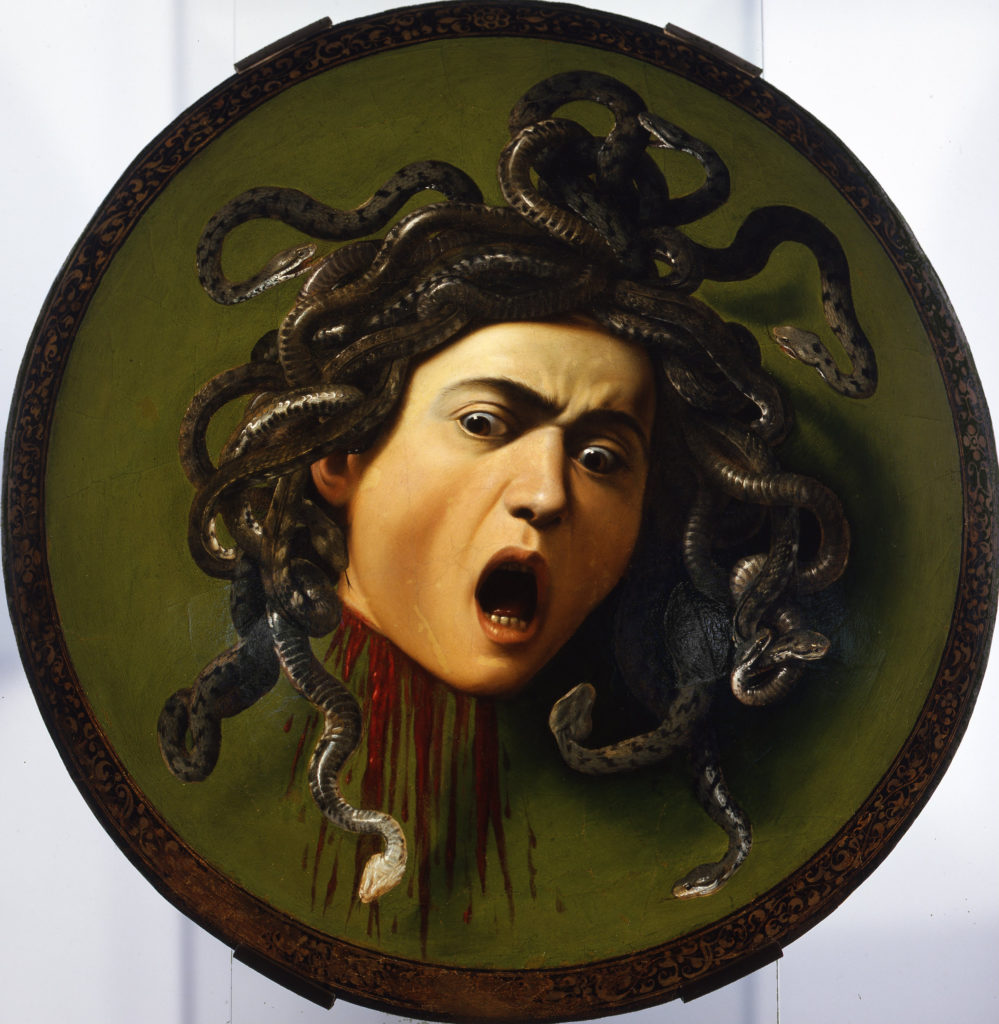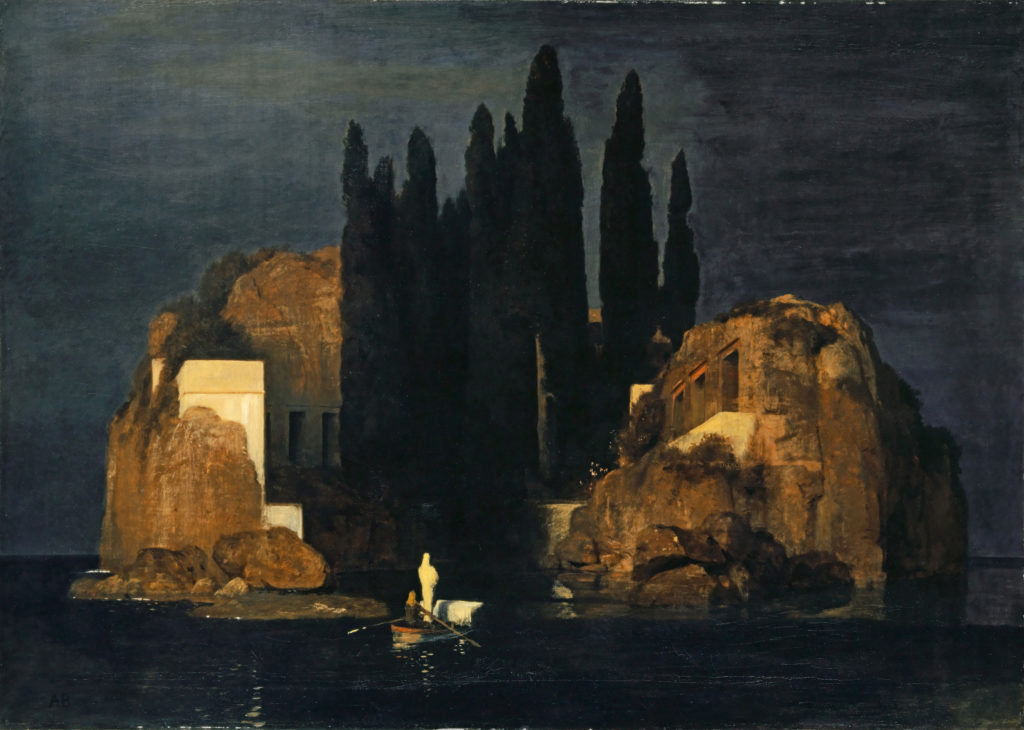
Caraavaggio, Medusa
Spengler, Lite
The Strange Death of Europe: Immigration, Identity, Islam, Douglas Murray, 2017, Bloomsbury, Hardback, 335pp., £18.99; reviews by Ed Dutton and Adam J Young
Murray’s dissection of Western Europe’s death wish is written as though we are looking back on it, having shaken ourselves free of it. Beginning with the end of the Second World War, Murray describes how we ended-up in the current crisis; scarred by religious conflict, ethnic segregation, radical Islamic terrorism, and the persecution of dissent. All of this happened within living memory, and much of it only within the last twenty years. It is as though Murray is a psychiatrist describing our descent into madness, only after we have become lucid and are wondering what on earth happened to us.
Like any good psychiatrist, Murray not only describes our period of dissociative amnesia, but its causes. The clue is at the beginning: ‘Europe is committing suicide. Or at least its leaders have decided to commit suicide.’ We see as the story unfolds that this is a top-down destruction of Western Europe. It begins with mass-immigration from third world countries after the War to rebuild a war-ravaged continent. For some inexplicable reason, it was assumed that these immigrants would not stay long and that even if they did, it would not be problematic.
When, in 1968, Enoch Powell, a shadow cabinet minister, recorded that in some locations British people felt like foreigners, he was sacked. This provoked a huge furore, ugly protests and the introduction of the catch-all term ‘racist’ to prevent any debate and to intimidate people into silence. A review of this book in the Guardian accuses Murray of being, ‘The right-wing journalist and commentator [who] cites Enoch Powell and wants to protect white Christian Europe from ‘outsiders’.’ But Murray is in fact quite critical of Powell and he bends over backwards to discover if the Left might have a point in any particular debate.
Charting the history of immigration into the UK, Murray suggests that a turning-point came when Barbara Roche, New Labour’s immigration minister, let almost anyone in, justifying this on the ground that she felt more at home in ethnically diverse places. Murray looks at the various distortions which New Labour employed in order to justify mass immigration. Concerning the claim that waves of immigration have always characterized English history, Murray notes that there had never been anything before on this scale or involving this level of cultural difference. The only major migration was of the Huguenots in the seventeenth century, and they have taken so long to integrate that even now some people refer to themselves as being of ‘Huguenot stock.’ Murray debunks all of these justifications for mass immigration until we get to the most desperate one: ‘Immigration is good because there’s a greater variety of take away food.’
This whole poignant history includes the suppressing of the systematic rape and enforced prostitution of underaged English girls by predominantly Muslim gangs and much else besides. If Muslim immigrants really are integrating into British culture, why, Murray wonders, are churches and pubs shutting down in areas in which they predominate?
We travel with the author around Europe as he speaks to migrants, journalists, government minsters and locals. He examines the predictable consequences of Merkel’s mass immigration of young Muslim men in 2015 not just into Germany but other countries, such as Sweden. He shows how, across the Continent, the thought police have ensured the total shut down of debate over this issue with serious critics of Islam having to go into hiding (or even being killed) as far back as the Salman Rushdie affair. We see double standards, a total lack of impartiality and shameful attempts to destroy the reputation of people who question the benefits of mass immigration.
Much of this will be all too familiar to readers of this journal. What perhaps is more original is the examination of why this has happened in Western Europe, given that Eastern European leaders vehemently oppose the altering of their societies as do their people. Murray’s first suggestion is that Western Europeans are uniquely susceptible to guilt and can be readily persuaded to let the world into their borders. A second reason is a power struggle among Europeans. You gain social status by virtue-signalling and by accusing others of being evil in some way (such as being ‘racist’). There is a zero cost to doing this and every benefit to doing so. So this sets-off an arms of race of thought policing in which ultimately no one dares express the truth. The third reason is that we have lost all sense of purpose. We no longer believe in the Christianity that inspired our civilization and so our lives have no eternal significance and there is apparently no reason to defend our culture. Murray, in this regard, takes us on an intriguing tour of contemporary literature, showing how it expresses, as in the novels of Michel Houellebecq, this prevalent pessimism. And note that he (Houellebecq) had to flee France for writing a satire on Islam.
And the fourth reason is that we have had it too good. Our living standards are so high that we’ve never suffered and never had to fight for anything. The last generation who really suffered were born before the War and it will soon die out. Eastern Europeans, in contrast, still know what it is to struggle for a better future. This is why they implacably oppose immigration; it will change their way of life and they don’t want it to be changed.
This is a thought-provoking, balanced and charitable assessment of the ‘strange death of Europe.’ But perhaps the most surprising thing is that Murray, an associate editor of Spectator, has even managed to find a mainstream publisher. However, there is one area which the author doesn’t address. It is a point which psychologists are seriously discussing. With the ending of Natural Selection since the Industrial Revolution, could it be that the instincts of Western Europeans have fundamentally changed, and that certain harmful mutations have no longer been selected against through high child mortality? Are we ‘committing suicide’ because there is no longer selection against mutant genes which make us want to do so?
EDWARD DUTTON is the author, with Bruce Charlton, of The Genius Famine: Why We Need Geniuses, Why They’re Dying Out, and Why We Must Rescue Them, University of Buckingham Press, 2015
____________________________
Review by Adam J Young –
To say that Europe is in crisis is an understatement. It is enduring a multitude of crises; a migrant, a moral, a cultural and an economic crisis, all of which are now combining into one, gigantic crisis, the collapse of the Old Europe as we have known it.
One author who is trying to decipher just why Western Europe is in free fall is Douglas Murray. In The Strange Death of Europe, he identifies the core problems that the former home of a once great culture is facing. The associate editor of the Spectator and the founder of three think tanks, Murray has traveled around Europe, to the migrant’s camps of Italy and Greece, talking to refuges, NGOs, and European citizens in order to ascertain the root of the problem. His book is full of facts that will disturb those not accustomed to what is happening in Europe, notably those concerning the increase in murders, rapes and terrorist attacks.
One of Murray’s main themes is the migrant crisis. He speaks with a sympathetic tone to migrants, some of whom are fleeing for their lives, and who understandably want to better themselves economically. Yet the towns affected by uncontrolled and unfettered mass immigration that he cites include a small Swedish village whose population has increased from a mere 82 to three-fold that in just one day.
Murray highlights one of the causes of this problem; the changing attitudes of politicians to immigration, making it a toxic subject that it is politically suicidal to address. One of the earliest cases was Enoch Powell. His ‘Rivers of Blood’ speech of 1969, discussing the consequences of mass immigration, ultimately destroyed him politically. Yet remarkably, as Murray points out, Powell had the support of well over half of the country and could have otherwise become Conservative Party Leader and then Prime Minister.
This growing disconnect between politicians (both right and left) and their core voters who want their identity preserved is somewhat baffling. Thus, we have Swedish politicians saying that they have no culture; French politicians promising to end immigration then doing the opposite; the British Labour party trying to bring in a new voter base by mass immigration and thereby alienating its classic working class voters; and the German leader Angela Merkel oscillating from stating that “multiculturalism has failed” to chastising people who want reductions to immigration.
Murray was brought up on the Isle of Lewis (as was Donald Trump’s mother). A member of the Presbyterian church, he only became an atheist after leaving university but he still considers himself a cultural Christian. He contends that we Europeans are searching for meaning in a nihilistic/hedonistic culture. Economic booms have made us better off but this doesn’t make for spiritual fulfilment.
Europe seems to be on the verge of defeat. The solutions offered in The Strange Death of Europe are few and far between. But perhaps things need to get much worse before they can get any better.

Arnold Böcklin, Island of the Dead
ADAM J YOUNG is a blogger based in the North East of England. Contact him through Twitter at @Justalocalserf.











Spengler is always worth re-reading, especially his extraordinarily prophetic “Hour of Decision”. So are Brooks Adams, Ibn Khaldun, Vico, Danilevsky, LeBon, Sorokin, Elmer Pendell, Paul Kennedy and Patrick Buchanan, among many others, in analyzing the general causes of western decline, and the post-WW2 ostensible “paralysis” in face of Muslim and African immigration.
A key factor in the current process has been the New Left of the mid-1960s which developed in the USA and France, and quickly spread to Britain. The ideological aim was “egalitarian” revolution, directed especially at overthrowing white patriarchal Anglo society, with its conservative attachment to patriotism, the armed services, traditional religion, private enterprise, and freedom of speech and association. The groups to be utilized specifically for this purpose were “women, blacks, immigrants, sexual minorities and students”. The main combined methods were incremental subversion of institutions and publicly organized demonstrations.
In Britain, their unholy trinity of “race-gender-class” indoctrination has attained almost complete dominance, from the education system to the Equality Act 2010. Their main push now is to consolidate the class war, with the emergence of Corbyn, media and mobile communication support, calls for street protests, industrial action, ethnic rebellion, mass MOB-ilization and McDonnell’s Marxist “insurrection”. The enemies within are well prepared for a Brexist breakdown and the next global banking crisis.
Marcuse and Gramsci have done their work, and now for Lenin.